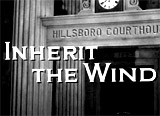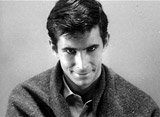|
Best Film Speeches and Monologues
|
|
Title Screen
|
Film Title/Year and Description of Film Speech/Monologue |
Screenshots
|

|
The Alamo (1960)
Screenwriter(s): James Edward Grant
 About
The Word "Republic" About
The Word "Republic"
Play clip (excerpt): 
Ready to defend the Alamo in the year 1836 during
the Texan War of Independence (or Texas Revolution), Tennessee
frontiersman Davy Crockett (John Wayne) spoke to Col. William
Travis (Laurence Harvey) about his feelings on the word 'republic.'
[Note: the Republic of Texas was established shortly after
the defeat at the Alamo]:
'Republic'. I like the sound of the word.
It means people can live free, talk free, go or come, buy
or sell, be drunk or sober, however they choose. Some words
give you a feeling. 'Republic' is one of those words that
makes me tight in the throat - the same tightness a man
gets when his baby takes his first step or his first baby
shaves and makes his first sound like a man. Some words
can give you a feeling that make your heart warm. 'Republic'
is one of those words.
Travis responded that he now had learned that
Crockett wasn't the "illiterate country bumpkin" that
most people believed, and that he had come to Texas to fight
with the others. |


|

|
The Alamo (1960)
Screenwriter(s): James Edward Grant
 Davy
Crockett's Speech to Flaca - "There's Right and There's
Wrong. You Got to Do One Or the Other" Davy
Crockett's Speech to Flaca - "There's Right and There's
Wrong. You Got to Do One Or the Other"
Play clip (excerpt): 
Davy Crockett (John Wayne) spoke to Flaca (Linda
Cristal), when she asked what was going to happen between
them:
And l was the one that said this country
was burnt-over sand. lt's green and growing. Like those
green pastures they talk about. Lord above. That's one
beautiful tree. This tree must've been growed before
man put his first dirty footprints on this prairie. Kind
of a tree Adam and Eve must have met under. You know something,
Flaca? l guess l saw who knows how many trees before
l ever took a long, thoughtful look at one. Mostly, l looked
at a tree to see was there a bear in it or an lndian
behind it...
I'm gonna tell
you something, Flaca, and I want you to listen tight. May
sound like I'm talkin' about me. But I'm not. I'm talkin'
about you. As a matter of fact, I'm talkin' about all people
everywhere. When I come down here to Texas, I was lookin'
for somethin'. I didn't know what. Seems like you added
up my life and I spent it all either stompin' other men
or, in some cases, gettin' stomped. Had me some money and
had me some medals. But none of it seemed a lifetime worth
the pain of the mother that bore me. It was like I was
empty.
Well, I'm not empty anymore. That's what's
important, to feel useful in this old world, to hit a lick
against what's wrong or to say a word for what's right even
though you get walloped for sayin' that word. Now I may sound
like a Bible beater yellin' up a revival at a river crossing
camp meeting, but that don't change the truth none. There's
right and there's wrong. You gotta do one or the other.
You do the one and you're livin'. You do the other and you
may be walkin' around, but you're dead as a beaver hat.
|




|

|
The
Apartment (1960)
Screenwriter(s): Billy Wilder, I.A.L. Diamond
 Powerless
- "I Have This Little Problem With My Apartment" Powerless
- "I Have This Little Problem With My Apartment"
Play clip (excerpt): 
As the film opened with credits and aerial helicopter
views of NYC, lonely, young, vulnerable, and subordinate office
clerk, C. C. "Bud" Baxter (Jack Lemmon) described
(in voice-over) how he was employed in a large impersonal Manhattan
life insurance firm, and was seen in a second-story apartment
window. He was an average hard-working, upwardly-mobile American
employee in a powerless position in life:
On November 1st, 1959, the population of
New York City was 8,042,783. If you laid all these people
end to end, figuring an average height of five feet six
and a half inches, they would reach from Times Square to
the outskirts of Karachi, Pakistan. I know facts like this
because I work for an insurance company - Consolidated
Life of New York. We're one of the top five companies in
the country. Our home office has 31,259 employees - which
is more than the entire population of, uh, Natchez, Mississippi.
I work on the 19th floor - Ordinary Policy Department -
Premium Accounting Division - Section W - desk number 861.
My name is C. C. Baxter - C. for Calvin, C.
for Clifford, however most people call me Bud. I've been
with Consolidated for three years and ten months and my take-home
pay is $94.70 a week.
The hours in our department are 8:50
to 5:20. (Closing bell rings) They're staggered by floors,
so that sixteen elevators can handle the 31,259 employees
without a serious traffic jam. As for myself, I very often
stay on at the office and work for an extra hour or two,
especially when the weather is bad. It's not that I'm overly
ambitious, it's just a, a way of killing time until it's
all right for me to go home. You see, I have this little
problem with my apartment.
I live in the West 60s, just half a block from
Central Park. My rent is $85 dollars a month. It used to
be $80 until last July when Mrs. Lieberman, the landlady,
put in a second-hand air conditioning unit. It's a real nice
apartment - nothing fancy - but kind of cozy - just right
for a bachelor. The only problem is - I can't always get
in when I want to.
|





|

|
Elmer
Gantry (1960)
Screenwriter(s): Richard Brooks
 "Love
is the Mornin' and the Evenin' Star" "Love
is the Mornin' and the Evenin' Star"
Play clip (excerpt): 
Huckster Elmer Gantry (Burt Lancaster) in a speakeasy
demonstrated his high-energy eloquence with words in this impromptu
Christmas sermon while collecting from patrons:
Oh I see. You think, uh, religion is for
suckers and easy marks and molly-coddlers, huh? You think
Jesus was some kind of a sissy, hey? Well, let me tell
you, Jesus wouldn't be afraid to walk into this joint or
any other speakeasy to preach the gospel. Jesus had guts.
He wasn't afraid of the whole Roman army.
(Pointing to a picture)
Think that quarterback's hot stuff? Well, let me tell you,
Jesus would have made the best little All-American quarterback
in the history of football. Jesus was a real fighter -
the best little scrapper, pound for pound, you ever saw.
And why, gentlemen? Love, gentlemen. Jesus
had love in both fists! And what is love? Love is the mornin'
and the evenin' star. It shines on the cradle of the Babe.
Hear ye, sinners. Love is the inspiration of poets and
philosophers. Love is the voice of music. I'm talkin' about
divine love - not carnal love.
|

|

|
Elmer
Gantry (1960)
Screenwriter(s): Richard Brooks
 "You're
All Sinners" "You're
All Sinners"
Play clips (excerpt):  
Gantry turned into an evangelizing, Bible Belt
revivalist preacher with tremendous showmanship, and rolled
up shirt-sleeves. He preached hellfire and brimstone, thumped
his Bible, performed miracles, and led repentant sinners to
conversion in the Bible Belt tent meetings:
Sin. Sin, Sin. You're all sinners. You're
all doomed to perdition. You're all goin' to the painful,
stinkin', scaldin', everlastin' tortures of a fiery hell,
created by God for sinners, unless, unless, unless you
repent. Repent with Sister Falconer
He also preached against the sin of boozing:
As long as I got a foot, I'll kick booze.
And, as long as I got a fist, I'll punch it. And, as long
as I got a tooth, I'll bite it. And, when I'm old and gray
and toothless and bootless, I'll gum it till I go to heaven
and booze goes to hell.
|


|

|
Inherit
the Wind (1960)
Screenwriter(s): Nedrick Young, Harold Jacob Smith
 Questioning
the Bible's Scientific Authority on the Witness Stand Questioning
the Bible's Scientific Authority on the Witness Stand
Play clips (excerpt):  
Henry Drummond's (Spencer Tracy) questioning
examination on the witness stand of opponent and prosecuting
attorney Matthew Brady (Fredric March) on the Scientific Authority
of the Bible during the so-called Monkey Trial:
- You believe that every word written in
this book should be taken literally?
- Everything in the Bible should be accepted exactly as
it is given there.
- Now what about this part
right here, where, uh, uh, it talks about, uh, Jonah being
swallowed by the whale? You figure that really happened?
- The Bible does not say a whale. It says a big fish.
-
As
a matter of fact, it says a 'great' fish. But I guess that's
- one's pretty much the same as the other. What do you think
about that business?
- I believe in a God who can make a whale and who can make
a man, and make both do what he pleases.
- The Bible is a book. It's a good
book. But it is not the only book.
- It the revealed word of the Almighty God, spake to the men
who wrote the Bible.
- How do you know that God didn't spake to Charles Darwin?
- I know because God tells me to oppose the evil teachings
of that man.
- Oh, God speaks to you?
- Yes.
-
He tells you what is right and wrong?
- Yes.
-
And you act accordingly?
- Yes!
-
So,
you, Mathew Harrison Brady, through oratory or legislature
or whatever, you pass on God's orders to the rest of the world!
Well, meet the Prophet from Nebraska!
- I... Please!
-
Is that the way of things?!
Is that the way of things?! God tells Brady what is good!
To be against Brady is to be against God!
- No! Each man is a free agent.
- Then what is Bertram Cates doing in a Hillsboro jail? Supposing
Mr. Cates had the influence and the lung power to railroad
through the state legislature a law saying that only Darwin
could be taught in school.
-
Ridiculous. Ridiculous. There is only one great
truth in the world.
-
The Gospel. The Gospel according to Brady!
God speaks to Brady and Brady tells the world! Brady, Brady,
Brady Almighty!
Ultimately, he forced Brady to exasperatingly
declare:
All of you know -- what I said was -- what
I believe -- I believe in the truth of the book of Genesis!
Exodus! Leviticus! Numbers! Deuteronomy! Joshua! Judges!
Ruth! 1st Samuel! 2nd Samuel! 1st Kings! 2nd Kings! Isaiah!
Jeremiah! Lamentations! Ezekiel --
|


|

|
The Magnificent
Seven (1960)
Screenwriter(s): William Roberts
 Courage
and Bravery Courage
and Bravery
Play clip (excerpt): 
Irish-Mexican gunfighter Bernardo O'Reilly (Charles
Bronson), one of the "Magnificent Seven" defending
an oppressed Mexican village, spoke harshly back to a peasant
boy who was ashamed to live in the village and believed his
father was a coward ("Take us with you, please!...We're ashamed
to live here. Our fathers are cowards"). He spanked the boy
and then told him:
Don't you ever say that again about your
fathers, because they are not cowards. You think I am brave
because I carry a gun? Well, your fathers are much braver
because they carry responsibility, for you, your brothers,
your sisters, and your mothers. And this responsibility
is like a big rock that weighs a ton. It bends and it twists
them until finally it buries them under the ground. And
there's nobody says they have to do this. They do it because
they love you, and because they want to. I have never had
this kind of courage. Running a farm, working like a mule
every day with no guarantee will ever come of it. This
is bravery. That's why I never even started anything like
that. That's why I never will.
|


|

|
 Psycho
(1960) Psycho
(1960)
Screenwriter(s): Joseph Stefano
 An
Explanation of Norman Bates' Dual, Schizophrenic Personality An
Explanation of Norman Bates' Dual, Schizophrenic Personality
Play clip (excerpt): 
Smug and officious police psychiatrist, Dr. Richmond
(Simon Oakland) in the Office of the Chief of Police in the
County Courthouse, reconstructed or 'explained' the mystery
of Norman Bates' (Anthony Perkins) schizophrenic psychosis
after questioning 'his mother' - since Norman no longer existed.
I got the whole story, but not from Norman.
I got it from his 'mother'. Norman Bates no longer exists.
He only half-existed to begin with. And now, the other
half has taken over, probably for all time...A psychiatrist
doesn't lay the groundwork. He merely tries to explain
it...
Now, to understand it the way I understood
it, hearing it from the 'mother', that is, from the 'mother'
half of Norman's mind, you have to go back ten years to the
time when Norman murdered his mother and her lover. Now he
was already dangerously disturbed, had been ever since his
father died. His mother was a clinging, demanding woman,
and for years, the two of them lived as if there was no one
else in the world. Then, she met a man and it seemed to Norman
that she threw him over for this man. Now that pushed him
over the line and he killed them both.
Matricide is probably the most unbearable crime
of all - most unbearable to the son who commits it. So he
had to erase the crime, at least in his own mind. He stole
her corpse. A weighted coffin was buried. He hid the body
in the fruit cellar, even treated it to keep it as well as
it would keep. And that still wasn't enough. She was there,
but she was a corpse.
So he began to think and speak for her, give
her half his life, so to speak. At times, he could be both
personalities, carry on conversations. At other times, the
'mother' half took over completely. Now, he was never all
Norman, but he was often only 'mother'. And because he was
so pathologically jealous of her, he assumed that she was
as jealous of him. Therefore, if he felt a strong attraction
to any other woman, the 'mother' side of him would go wild.
(To Lila) When he met your sister, he was touched
by her, aroused by her. He wanted her. That set off the jealous
'mother', and 'mother' killed the girl. Now after
the murder, Norman returned as if from a deep sleep, and,
like a dutiful son, covered up all traces of the crime he
was convinced his 'mother' had committed!...
A man who dresses in women's clothing in order
to achieve a sexual change or satisfaction, is a transvestite. But
in Norman's case,
he was simply doing every thing possible to keep alive the
illusion of his mother being
alive. And when reality came too close, when danger or
desire threatened that illusion, he'd dress up, even
to a cheap wig he bought. He'd walk about the house, sit
in her chair, speak in her voice. He tried to be his
mother. And, uh, now he is. Now that's what I meant
when I said I got the story from the 'mother'. You see, when
the mind houses two personalities, there's always a conflict,
a battle. In Norman's case, the battle is over, and the dominant
personality has won. (And the $40,000? Who got that?)
The swamp. These were crimes of passion, not profit.
|



|

|
 Psycho
(1960) Psycho
(1960)
Screenwriter(s): Joseph Stefano
 "She
Wouldn't Even Harm a Fly" Speech "She
Wouldn't Even Harm a Fly" Speech

Play clip (excerpt): 
In his jail cell, blanket-wrapped Norman Bates
(Anthony Perkins, but "Mother's" voice supplied by
Virginia Gregg) offered his final internal thoughts after being
overtaken by Mother, in voice-over. The voice of "Mother" spoke
in Norman's head, and condemned her son for the crimes, while
she claimed that she was harmless:
It's sad when a Mother has to speak the
words that condemn her own son, but I couldn't allow them
to believe that I would commit murder. They'll put him
away now, as I should have years ago. He was always bad
and in the end, he intended to tell them I killed those
girls and that man, as if I could do anything except just
sit and stare, like one of his stuffed birds.
Oh, they
know I can't even move a finger, and I won't. I'll just
sit here and be quiet, just in case they do suspect me.
They're probably watching me. Well, let them. Let them
see what kind of a person I am. I'm
not even gonna swat that fly. I hope they are watching. They'll
see. They'll see and they'll know, and they'll say, 'Why,
she wouldn't even harm a fly.'
|





|



































